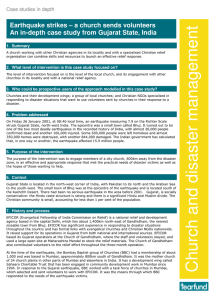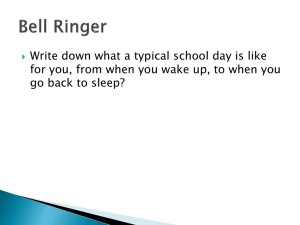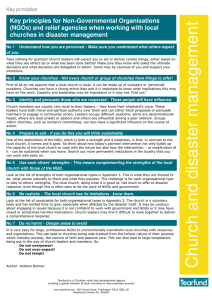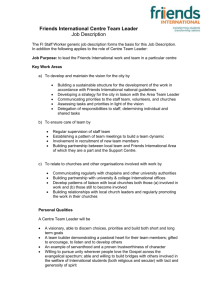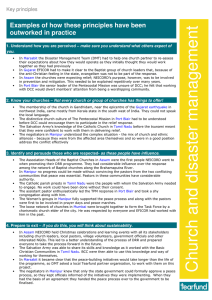The Right to Hope
advertisement
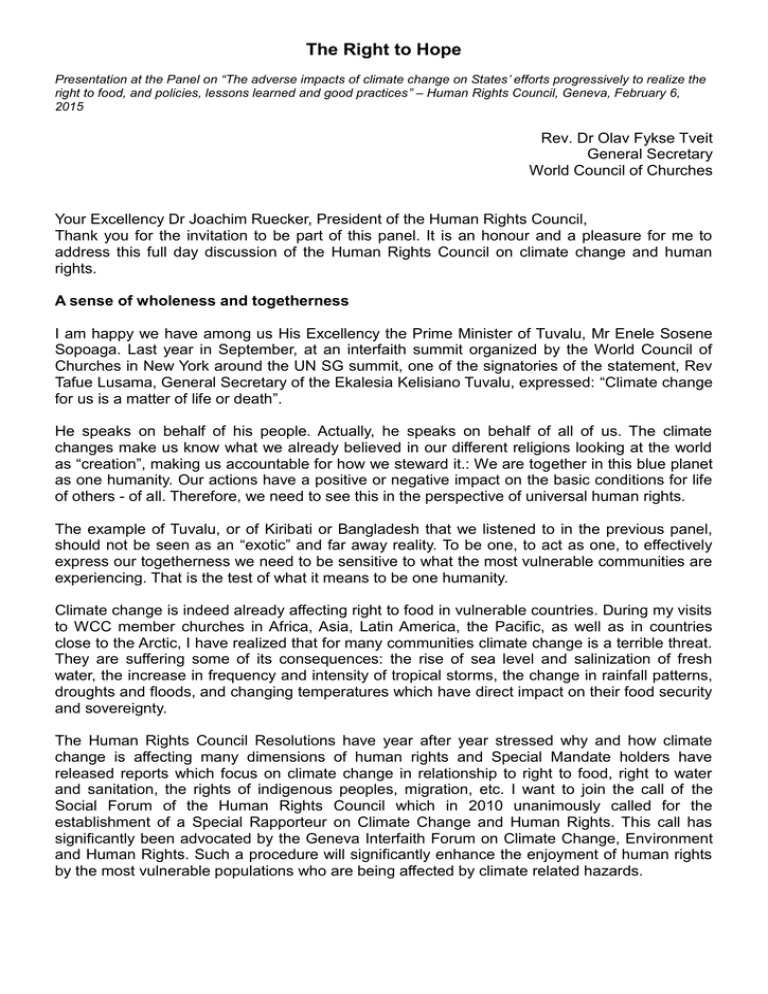
The Right to Hope Presentation at the Panel on “The adverse impacts of climate change on States’ efforts progressively to realize the right to food, and policies, lessons learned and good practices” – Human Rights Council, Geneva, February 6, 2015 Rev. Dr Olav Fykse Tveit General Secretary World Council of Churches Your Excellency Dr Joachim Ruecker, President of the Human Rights Council, Thank you for the invitation to be part of this panel. It is an honour and a pleasure for me to address this full day discussion of the Human Rights Council on climate change and human rights. A sense of wholeness and togetherness I am happy we have among us His Excellency the Prime Minister of Tuvalu, Mr Enele Sosene Sopoaga. Last year in September, at an interfaith summit organized by the World Council of Churches in New York around the UN SG summit, one of the signatories of the statement, Rev Tafue Lusama, General Secretary of the Ekalesia Kelisiano Tuvalu, expressed: “Climate change for us is a matter of life or death”. He speaks on behalf of his people. Actually, he speaks on behalf of all of us. The climate changes make us know what we already believed in our different religions looking at the world as “creation”, making us accountable for how we steward it.: We are together in this blue planet as one humanity. Our actions have a positive or negative impact on the basic conditions for life of others - of all. Therefore, we need to see this in the perspective of universal human rights. The example of Tuvalu, or of Kiribati or Bangladesh that we listened to in the previous panel, should not be seen as an “exotic” and far away reality. To be one, to act as one, to effectively express our togetherness we need to be sensitive to what the most vulnerable communities are experiencing. That is the test of what it means to be one humanity. Climate change is indeed already affecting right to food in vulnerable countries. During my visits to WCC member churches in Africa, Asia, Latin America, the Pacific, as well as in countries close to the Arctic, I have realized that for many communities climate change is a terrible threat. They are suffering some of its consequences: the rise of sea level and salinization of fresh water, the increase in frequency and intensity of tropical storms, the change in rainfall patterns, droughts and floods, and changing temperatures which have direct impact on their food security and sovereignty. The Human Rights Council Resolutions have year after year stressed why and how climate change is affecting many dimensions of human rights and Special Mandate holders have released reports which focus on climate change in relationship to right to food, right to water and sanitation, the rights of indigenous peoples, migration, etc. I want to join the call of the Social Forum of the Human Rights Council which in 2010 unanimously called for the establishment of a Special Rapporteur on Climate Change and Human Rights. This call has significantly been advocated by the Geneva Interfaith Forum on Climate Change, Environment and Human Rights. Such a procedure will significantly enhance the enjoyment of human rights by the most vulnerable populations who are being affected by climate related hazards. In our Christian understanding, shared by other religions, these are basic issues of justice and of our faith in God creating all of us to live together. As the 2014 interfaith climate statement reads: “We recognize that these effects disproportionally affect the lives, livelihoods and rights of poorer, marginalized and therefore most vulnerable populations, including indigenous peoples. When those who have done the least to cause climate change are the ones hardest hit, it becomes an issue of injustice. Equitable solutions are urgently needed.” Human rights should be, at the international and national legal frameworks, a concrete way to make more just societies. The scientific consensus on human induced climate change has been clearly expressed by the Intergovernmental Panel on Climate Change (IPCC) Fifth Assessment Report. We know enough. Now it is a matter of what we do. This moral call has been expressed by various religious leaders over the decades. Last week, the Orthodox Ecumenical Patriarch Bartholomew I, travelled to Guiuan, in the Philippines at the invitation of the French President to express solidarity with the victims of typhoons and to call for a proper preparation for COP21 in Paris. At that occasion His All Holiness expressed “We cannot separate our concern for human dignity, human rights or social justice from concern for ecological preservation and sustainability”. In the World Council of Churches we have been addressing specifically climate change since the late 1980s, linking it to environment, economic justice and peace issues. Because climate change has, of course, environmental, political and economic dimensions. It also has ethical and spiritual dimensions. We cannot have an isolated and narrow understanding of climate change. We need to address the climate crisis from all these perspectives at the same time to be able to handle this as one humanity. The right to hope If we know, as we do, that our action has an impact on the environment, we must also believe that our action can have a positive effect. Acknowledging the climate crisis should not paralyze us but push us to change. We, who live in rich countries, need to change our lifestyle patterns. Those in vulnerable countries should have the means to build resilience and adapt. We know individual change is not enough. The change should be at the community and national levels. But even at the latter, “we share the conviction that the threats of climate change cannot be curbed effectively by a single State alone but only by the enhanced co-operation of the community of States, based on principles of mutual trust, fairness and equity, precaution, intergenerational justice and common but differentiated responsibilities and capabilities” (Interfaith climate summit statement, 2014). Thus, the international legal framework is of utmost importance. The meeting last month in Geneva of the UNFCCC process showed how far we still are from an agreement that is “ambitious enough to keep temperature from rising well below 2° Celsius; fair enough to distribute the burden in an equitable way; and legally binding enough to guarantee that effective national climate policies to curb emissions are well funded and fully implemented”, as faith leaders expressed in New York last September. As a fellowship of churches we listen to and echo the cry of the poor and the cry of the earth because of climate change. Furthermore, as communities of faith we believe things can change. We are not “apocalyptic”, believing the worst to happen. This full day discussion on this global arena on human rights and climate change is a sign of hope. We are deepening our understanding of the challenge. Let us through our actions show that we understand how we all 2 are dependent on our wholeness and togetherness. Let us as one humanity defend the rights of the most vulnerable. The world can only benefit from strengthening the cooperation between the international community, the Human Rights Council, civil society and faith based organizations in responding to one of the biggest threats of the world, our common world, today. Therefore, my friends, let us enhance the right to hope. Despite all the negative conditions, we have the right to hope, not as a passive waiting but as an active process towards justice and peace, where human rights should pay a key role. In the World Council of Churches we say that we are on a “pilgrimage of justice and peace”. As human beings we are all pilgrims in our lives, searching for meaning, for change, for hope. Our faith convictions express and nurture the hope for the future, for next generations, for one earth and for one humanity. 3
